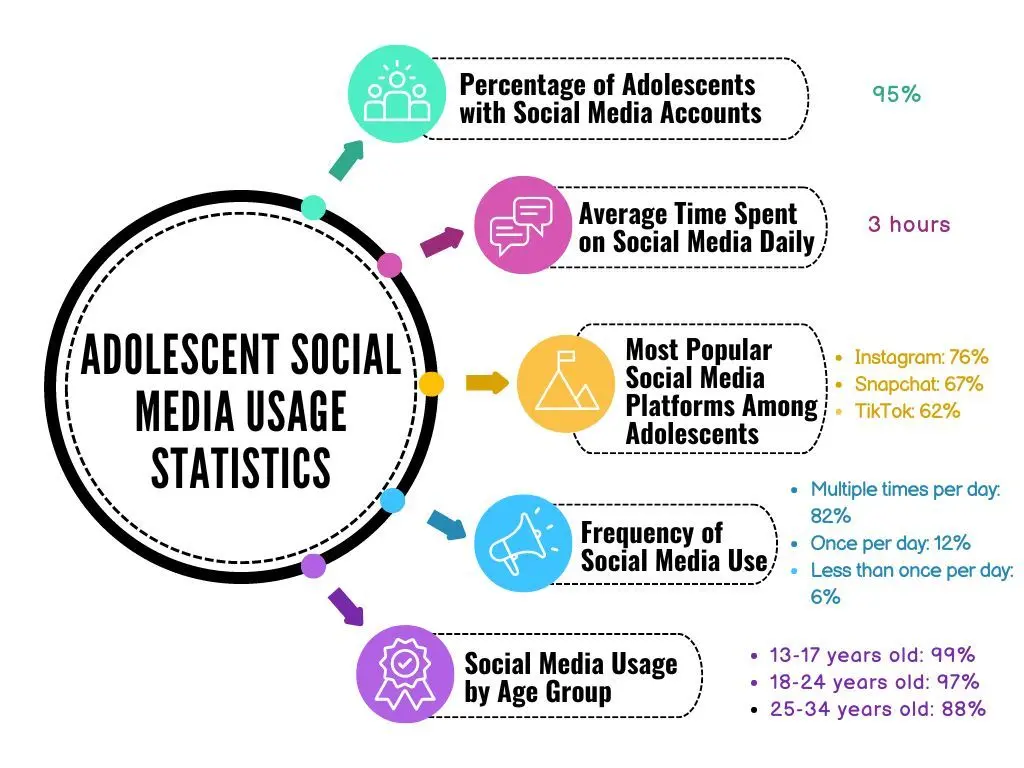Champion a balanced approach to social media use to make informed choices

Are you anxious about the profound impact social media has on adolescents? In today’s digitally connected world, it’s impossible to ignore the pervasive influence it holds. As a parent, understanding and addressing adolescent engagement with social media is paramount. How can we navigate the challenges and opportunities presented by this digital landscape to ensure our children thrive? This blog delves into precisely that, offering insights into balancing the complexities of social media in adolescents’ lives. Let’s explore the importance of guiding adolescents through this digital age, where challenges and opportunities intersect, shaping their experiences online and offline.
Why Should Parents Understand Adolescents’ Relationship with Social Media?

Adolescents’ presence online is not just significant; it’s growing exponentially, mirroring the shift towards digital connectivity in today’s society. Statistics and trends reveal a staggering amount of time spent on various social platforms, highlighting the need for parental awareness and guidance.
But it’s not just about the numbers. The psychological impacts of social media on adolescents cannot be overstated. The digital realm holds immense power over our children’s emotional well-being, from influencing self-esteem to shaping identity formation.
Moreover, peer influence and social dynamics play a pivotal role in adolescents’ online experiences. Whether it’s the pressure to conform or the desire for validation, navigating social platforms can be a complex journey for our adolescents. Understanding these dynamics is crucial in providing support and guidance as they navigate the digital age.
What are The Challenges of Adolescents’ Social Media Use?
If we want to save our loved ones, first we need to know the real-time problems and their intensity.

1. Cyberbullying and Online Harassment
- Recognizing the Signs: Adolescents may experience cyberbullying in various forms, including harassment, threats, or spreading rumors online.
- Impact on Mental Health: Cyberbullying can have severe consequences on adolescents’ mental well-being, leading to increased stress, anxiety, and depression.
- Preventive Measures: Encourage open communication with your child about their online experiences. Teach them to block or report abusive behavior and seek help if needed.
- Setting Boundaries: Establish guidelines for social media usage and monitor their online activities to ensure a safe environment.
2. Addiction and Screen Time Management
- Understanding Digital Addiction: Excessive screen time can lead to addiction, affecting adolescents’ productivity, sleep patterns, and overall well-being. A study published by Twenge and Campbell (2018) found a significant increase in depressive symptoms and suicide rates among adolescents correlated with increased screen time and social media use.
- Promoting Healthy Habits: Encourage a balance between online and offline activities. Set limits on screen time and encourage physical exercise and face-to-face interactions.
- Lead by Example: Model healthy screen time habits yourself and engage in activities that don’t involve screens, such as family outings or hobbies.
3. Privacy Concerns
- Protecting Personal Information: Teach adolescents about the importance of safeguarding their privacy online, including not sharing sensitive information or location data.
- Understanding Privacy Settings: Familiarize your child with privacy settings on social media platforms to control who can view their content and interact with them.
- Digital Footprint Awareness: Help adolescents understand the permanence of their online presence and how their actions online can impact their future opportunities. According to a survey conducted by the Pew Research Center in 2018, 95% of teens have access to a smartphone, and 45% report being online ‘almost constantly,’ raising concerns about privacy and data security
Navigating these challenges requires proactive parental involvement and ongoing communication with adolescents to ensure their safety and well-being in the digital world.
How to Navigate Opportunities?

Here are some ways.
1. Educational Resources and Learning Communities
- Access to Information: Social media platforms offer a vast array of educational resources, from informative articles to online courses, providing adolescents with opportunities to expand their knowledge beyond the classroom.
- Engagement with Peers: Online learning communities allow adolescents to collaborate with peers, share insights, and seek help when navigating challenging academic concepts.
- Parental Guidance: Encourage your child to explore reputable educational resources and engage in discussions with them about the content they find online, fostering critical thinking skills and deeper understanding.
2. Creative Expression and Digital Literacy
- Platform for Creativity: Social media provides a platform for adolescents to express themselves creatively through art, writing, photography, and more, helping them develop their unique talents and interests.
- Digital Literacy Skills: Engaging with various media formats online enhances adolescents’ digital literacy skills, including media literacy, content creation, and online communication.
- Encouraging Exploration: Support your child’s creative endeavors by providing access to tools and resources that allow them to explore different forms of expression and develop their digital skills.
3. Building Positive Relationships
- Social Connection: Social media enables adolescents to connect with peers who share similar interests and experiences, fostering a sense of belonging and community.
- Mentorship Opportunities: Adolescents can seek out mentors and role models online, learning from their experiences and receiving guidance and support in various aspects of their lives.
- Parental Involvement: Stay involved in your child’s online interactions, encouraging positive relationships while also guiding them on navigating potential risks such as cyberbullying or inappropriate content.
During adolescence, support your children in building valuable skills, fostering creativity, and nurturing meaningful connections in the digital age to help them grow to their full potential.
What are the Strategies for Parents and Guardians?
It’s our responsibility to protect and train the child for the challenges of the digital era. For that, we need to know first, how to do it. Here are some top strategies.

1. Open Communication
- Create a Safe Space: Foster an environment where your adolescent feels comfortable sharing their thoughts, feelings, and experiences without fear of judgment.
- Listen Actively: Practice active listening when your child talks about their online activities or concerns, showing empathy and understanding.
- Be Non-judgmental: Avoid jumping to conclusions or criticizing their online behavior; instead, offer guidance and support in a non-threatening manner.
2. Setting Healthy Boundaries
- Establish Clear Rules: Set clear guidelines for screen time limits, appropriate content, and online interactions, ensuring your adolescent understands the boundaries.
- Lead by Example: Model healthy screen time habits yourself, demonstrating moderation and balance in your digital usage.
- Encourage Offline Activities: Encourage your child to engage in offline activities such as hobbies, sports, or spending time with family and friends, promoting a well-rounded lifestyle.
3. Role Modeling
- Be a Positive Influence: Demonstrate positive online behavior by engaging respectfully and responsibly in your online interactions.
- Teach Digital Etiquette: Educate your child about the importance of online etiquette, including being kind, respectful, and mindful of others’ feelings.
- Monitor and Guide: Monitor your child’s online activities periodically and provide guidance when necessary, helping them navigate potential risks and challenges.
You can play a crucial role in safeguarding your adolescents’ mental health and well-being in the digital age.
How to Empower Your Adolescents in the Digital Age?
We as parents need to empower our children in the digital age so they can counter perceived issues. Here are some top of the practical ways.

1. Critical Thinking Skills
- Question Everything: Encourage adolescents to critically evaluate the content they encounter online, questioning its accuracy, credibility, and potential biases.
- Check Sources: Teach them to verify information by cross-referencing multiple sources and consulting reliable sources such as academic journals or reputable news outlets.
- Stay Informed: Keep adolescents updated on current events and teach them to discern between fact and opinion, empowering them to make informed decisions.
2. Self-care Practices
- Practice Empathy: Instill values of empathy and kindness, reminding adolescents to consider the feelings of others before posting or commenting online.
- Promote Positive Engagement: Encourage adolescents to contribute positively to online communities by sharing helpful information, offering support, and engaging in constructive discussions
- Set Limits: Encourage adolescents to set boundaries around their social media use, including taking regular breaks and avoiding excessive scrolling.
- Seek Support: Remind adolescents that it’s okay to seek help if they feel overwhelmed or stressed by their online experiences, whether from trusted adults, friends, or mental health professionals.
You can empower them to navigate social media responsibly and thrive in the digital age.
Conclusion
As we wrap up our discussion on adolescents and social media, it’s evident that navigating this digital landscape requires a balanced approach. Social media holds immense potential for adolescent growth, providing avenues for learning, creativity, and connection. However, it’s equally important to advocate for a balanced approach, maximizing the opportunities while mitigating the risks.
By embracing the positive aspects of social media, such as educational resources, creative expression, and positive relationships, parents can empower their adolescents to thrive in the digital age. Encouraging open dialogue and support is crucial in guiding them through the complexities of online interactions and promoting their mental and emotional well-being.
As you continue to support your adolescent in their journey with social media, remember the importance of maintaining a healthy balance and fostering critical thinking skills. Stay actively involved in their online activities, set boundaries when necessary, and prioritize their self-care.
Let’s continue this conversation and support each other in navigating the challenges and opportunities of raising adolescents in the digital age together. We can empower our adolescents to make responsible choices and thrive in today’s digital world.
Feel free to share your thoughts and experiences in the comments section below.
You may also be interested in : Why Rebellious Teenager Act Out and How to Support Effectively